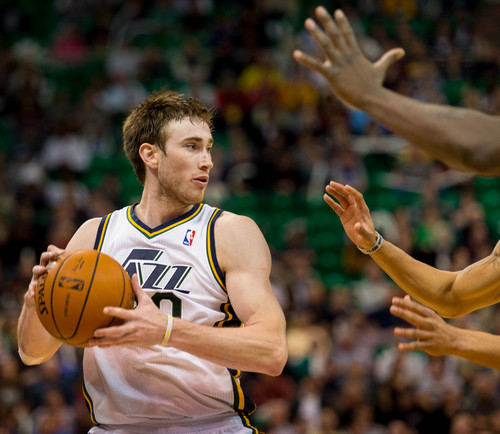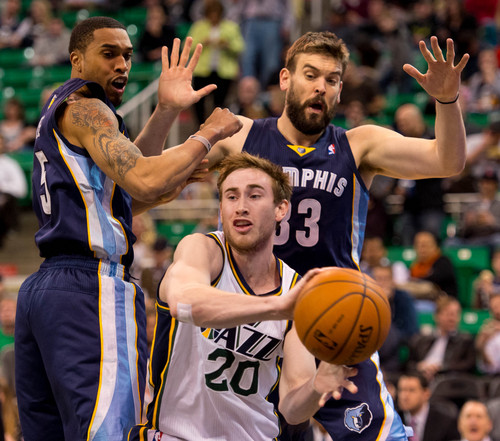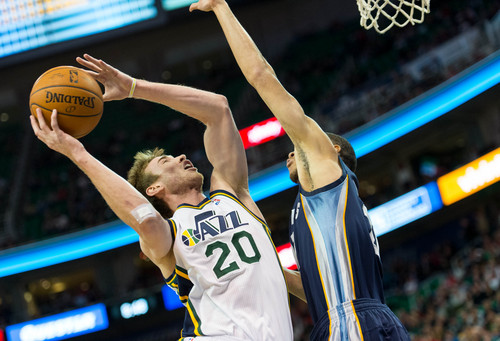This is an archived article that was published on sltrib.com in 2014, and information in the article may be outdated. It is provided only for personal research purposes and may not be reprinted.
Alex Jensen set a screen at the high post, with Johnnie Bryant on the wing. Quin Snyder cut inside, took a pass and flipped the ball off the backboard.
After the Jazz's pre-summer league practice session Tuesday night, Snyder and the rest of his coaching staff stayed on the court, walking through a play they intended to teach the next day to Trey Burke, Dante Exum and the other young players in the camp.
"It looks a lot better when they're running it than when us old guys are out there," Snyder said later, smiling.
If the offensive set appeared regimented and plodding with that cast executing it, what emerged from the interviews that followed with Burke and Exum was more upbeat. And those words relate to why Gordon Hayward should thrive in Snyder's system and why his return should be embraced, once the sticker shock wears off from the max contract that Hayward will sign with Charlotte — to be matched by the Jazz.
First impressions of Snyder and his staff? "They're giving us a lot more freedom," said Burke, the second-year point guard.
Exum, the No. 5 pick in the NBA draft, described a "free-flowing-type offense," suggesting that part of Snyder's design is for either guard to handle the ball when he and Burke play together.
The scheme should suit Hayward, with a faster pace and better ball movement. He'll have to improve under Snyder to justify the Jazz's exponentially increased investment in him, with a $14.7 million salary in 2014-15.
Hayward will respond well with better players surrounding him, and that's where Snyder's staff comes into play. In hiring his assistants, Snyder clearly favored player development skills over NBA bench experience.
He mildly contested that point Tuesday in his first comments about the staff since the June 25 announcement of the hirings, partly by saying that D-League work is valid. "You're starting to see people value that experience more and more," Snyder said.
Well, it worked for him. So now the Jazz have three former D-League head coaches — Snyder, Jensen and Brad Jones — plus longtime NBA assistant Mike Wells, Antonio Lang and Bryant.
The Jazz need everything the "D" stands for — development. Burke, Exum and fellow rookie Rodney Hood must make strides this season and beyond, and the need for improvement doesn't stop with them.
The only way the Jazz can accelerate what looks like a long, slow climb toward respectability in the NBA is for someone, anyone, to grow above expectations. Whether that's Enes Kanter, Alec Burks, Derrick Favors or even Hayward, factoring in the higher standard that comes with his contract, the current players have to make a leap in this league.
Snyder believes this staff can make that happen.
"I wanted to get guys that could really coach … when I say coach, that can teach," he said.
Snyder liked the way his coaches kept the players moving during drills, practicing efficiently. That's a start.
So is Snyder's constant emphasis on defense. Of course, that's exactly what Tyrone Corbin talked about last season, and where did it get him?
Burke was cautious about comparing the coaches, saying nothing negative about Corbin. But he likes Snyder. They've developed "a personal relationship already," Burke said. "He pulls me to the side, gets on me about being that leader out there, being that voice that needs to be heard, so I'm excited to play for him. Very excited."
Hayward should feel the same way, for reasons that go beyond dollars.
Twitter: @tribkurt







